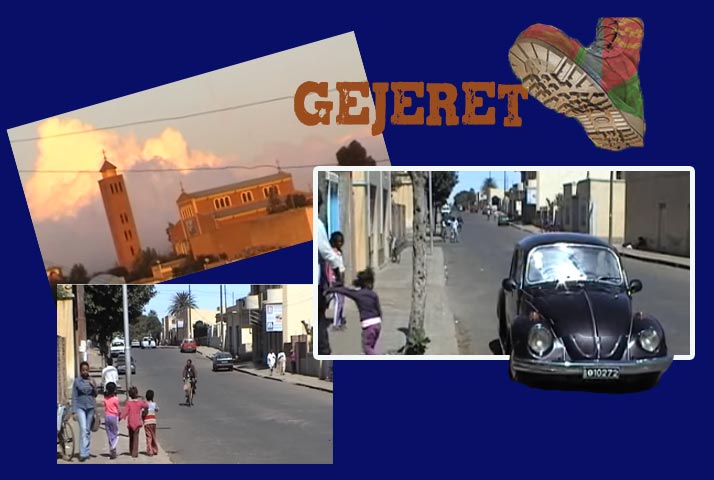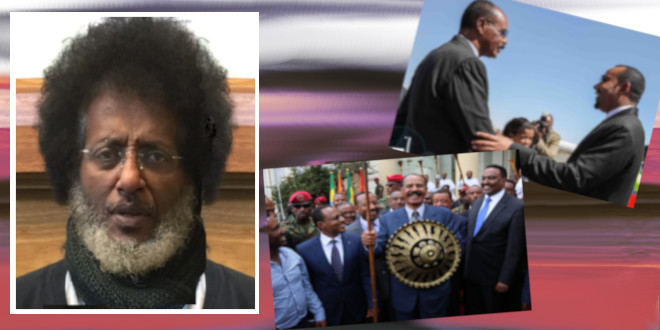London’s Attractions And The Eritrean-Ethiopian Love Affair
Every time an individual or an organisation sets an agenda (convenes a conference for example), Eritreans in the opposition camp get distracted and waste a lot of resources and energy in trying to understand the motives; they might support it, oppose it, or even go as far as condemning it. It becomes like suspense TV show where the results are unknown giving room for our well nurtured suspicious psyche takes hold and controls us. Such has been the case during the Brussels conference and the same is repeating itself in anticipation of the “London Peace Conference.” We seem to have lost our compass, our sense of direction, our focus and our initiatives to work on our own agenda, our own priorities at our own pace. Ironically, the conference has already unleashed a cyber war in our camp.
Before wasting your energy and mine on some legitimate questions I have about the conference, I would like to share with you my experience with London and what attracts me to the city—something that may in itself be ‘a hafiz,’ an incentive to attend.
I have been to London several times. A specific trip that I remember was on the beginning of April 2002 when the coffin of the Queen Mother was moved from one London palace to another in preparation for the funeral: It was interesting to see thousands of ordinary people queuing voluntarily (not as in the third world were people are forced to attend state gatherings and then the governments boast of the huge number of people who attended on their own), to watch the procession. It was a sharp contrast to the situation in our country where overnight, a national hero could be declared a traitor just because he entertains a view opposed to the establishment. Even notorious criminals had their place in the British museums. Not only that, but the British do not seem to hide their bitter past. There is a museum of the history of torture which shows how it was practised during different periods. If the past is completely deleted or distorted, what would one expect of the future!
The first time I visited London the plane approached Heathrow under a clear sky and the houses seemed to me like a piece of artwork of beads connected to each other. Later on I learned that there were many semi-circled streets known as Crescent beside those that carry the word ‘Road’ or ‘Gardens’ as a suffix.
The moment I disembarked from the plane and approached the passport check counters, I felt like I was in an international melting pot. I saw all types of people, colours, waves, ages… from almost all over the world. I saw People with colourful traditional clothes (mostly Africans) and women with different hairstyles. It felt like people were coming from ancient civilizations such as Egypt, Mesopotamia, Songhai & Timbaktu, Incus and Aztec, Greece, Rome, and perhaps some aliens coming from Mars.
Inside the city, one thinks he knows the places and names from before. It clicks back from the English literature into your memory and you start to search into your internal computer: Piccadilly, Trafalgar Square, West Minister, Waterloo and Fleet Street where newspapers flourished long before they are dwarfed by the Internet. In the city, one also notices the richness, the wealth, the accumulation of knowledge, the blunder of the former colonies’ natural and human and material resources. Couldn’t any one from those colonies claim a right to London and its material and spiritual treasure as my late Sudanese colleague Attaib Zeroug remarked during his first visit to the city in the late eighties.
The attractions and temptations of London are limitless in space and time, above, underground and sideways. They take you into the realms of the unknown…the past, the present and the future into the realms of human mind and behaviour. They unleash in you the desire to dig and excavate. The city can take you as far as your interests, your time, your energy and your pockets can stretch.
Then there is this strangeness: no written constitution, driving on the left, use of the foot and pound system, different electrical plugs, obsession with tea and milk, the private rights of way (no trespassing), the presence of separate schools for girls, which are generally regarded by the west as backward when it happens in the developing countries.
London is also the city that defined and made me aware of my religious identity on one of my visits. I arrived in London on the 6th of July 2005 to make it to an early appointment with a colleague the next day, which was luckily delayed—otherwise, I would have been on one of the bombed underground trains. It was a shocking experience for me. London was a symbol of resistance in supporting developing countries. The largest demonstration against the Iraq war in Europe was held there.
One feels victimised twice—when his religion is used as a pretext to kill innocent civilians (contrary to the sanctity of life that it promotes) and when he faces massive Western media attacks that try to make him feel as a suspect just because of his belief. That may be the reason why the authors of the ‘Eritrean Covenant’ correctly felt the need to define themselves, something others who do not perceive the burden could find difficult to understand:
“The need for us to consider speaking out collectively has become ever more important and urgent especially in this post 911 era where politics of fear is opportunistically peddled by the ruling clique in Asmara and some politicians in the opposition.”
There is also the obsession with the excessive informative signs including audio-visual: look to the right, to the left, mind the gap, stand clear of the doors, way out, etc. I thought, maybe there are signs in the private body parts that show the signs to the way in and way out during those moments of intimate passion. During my last visit, a couple of weeks ago, the only signs missing were those of the “London Peace Conference.”
Some legitimate questions
Source of funding
The first obvious question is, who is funding the conference?
Knowing the funders helps one know their agenda and what their real goals are. I have met a number of the organisers and the only thing they know was that Paulos Tesfagiorgis has secured the money and he did not want to disclose the source. One of the organisers, whom I trust said, “Paulos just brought the money and said, hold this conference, and he did not interfere in the process that followed at all.” Another one mentioned that some people had asked for the ‘Eritrean Covenant’ to be discussed in the conference, but Paulos had emphatically said that it was ”out of the question.” I wonder how my colleague Omer Jabir would travel to London with the ‘The Eritrean Covenant’ in his hands when including it is “out of the question”? It is not included in the agenda for the meeting.
This funding issue reminded me about a Tigre song we used to sing when were kids. There are different versions of it, but ours was, ‘Abuye mesa mn sefer ib shentet mil’et mn temer’ (My father arrived with a bag full of dates). This was during the good old days when dates were regarded as a hard to get precious delicacy. Didn’t the renowned Wed Amir describe the lips of his lover as, ‘Kenafera messl temr Kassala’ (Her lips resembling the the dates of Kassala). I remember during my childhood when shopkeepers gave us ‘halewat,’ stone-hard candies to attract clients to shop from their stores a traditional advertisement long before it became science and arts and ended up polluting our minds and our physical space.
I do not want to write more about Paulos; you can refer to my open letter to him.
To the best of my knowledge, the money being used in London is taxpayers’ money given out by a western institution. That institution is keen to have a dialogue with the Eritrean regime and has a view on how to solve the crisis in Eritrea. They hope that by bringing together the various factions of the EPLF/PFDJ they could bring the Eritrean-Ethiopian stalemate to an end. Therefore, they do not want to embarrass neither the Eritrean regime, nor the Ethiopian Government. They seem to have full confidence in Paulos, so far, and that is why he is provided with the money.
I hereby challenge the organisers of the conference to disclose the source of funding and thus prove me wrong. Western institutions are governed by laws and are accountable, and sooner or later they will be, secrecy doesn’t travel too far in the West, especially when there are enough stakeholders around.
Definition of the problem
In the appetizer conference that was held in December 2009, the emphasis was on peace between Eritrea and Ethiopia. Some of the participants strongly objected and indicated the need to prioritize the need for dialogue among Eritreans first and they reached an agreement on that. Now Ethiopia has been replaced by the Horn of Africa, with an emphasis for the need of Peace between the peoples of Ethiopia and Eritrea. But who has defined the problem and how? What is the basis for the assumptions that made addressing this issue important? Is there a problem between Eritreans and Ethiopians? What was Paulos’s role in defining the problem?
I was in Asmara During the breakout of the war between Eritrea and Ethiopia in 1998,. We had a nice worker from Tigrai in our house and she was advised to leave the country, we saw her off. We needed a replacement for her, so I went to ‘EndaMariam’ where maids would be found, to employ another one. Most of them were from Tigray. I met one of them and she interviewed me, as they usually do: How many children do you have and their ages? How many rooms are there in the house? Are you a Muslim?. Finally she decided she did not want to work with a Muslim family and to be fair, there were others who preferred to work for Muslims for one reason or another. Imagine! This was in the middle of the war and this was a vulnerable Tigrian woman dictating her terms to an Eritrean, in the middle of Asmara! For Gods sake, tell me if there is a problem between the people of both countries. I note with pride that during the war period, generally speaking there were negligible incidents where people took the law in their hands and mistreated Tigreans—and there were incidents perhaps instigated by the security forces. However, this does not mean that Tigreans felt secure; the state apparatus was after them. Even when the EPLF took control of the country in 1991, there were no public repercussions against Ethiopians. There was no bitterness, there was no hatred. I guess this has also to do with our culture. At present, the Eritrean opposition groups are hosted in Ethiopia and so far there are no indications that the Ethiopian Government is interfering in their affairs or dictating its own terms. The people who live in the border between both countries still intermarry and live in peace.
There is one thing that Tigrinya intellectuals do not speak about loudly (Aw ilka zeybekeyo mot htsooy’). Despite all the Tigrinya hegemony that Isaias and his regime has temporarily succeeded so far in achieving, his biggest blunder with regards the interests of the Tigrinya kinsmen is the war he initiated in 1998. The war was basically between the Tigrinya dominated Eritrean Government and the Tigrean dominated Ethiopian Government. It was among other things, on who becomes a junior partner and who becomes a senior partner in leading the Tigrinya in both countries. That was the reason that basically caused a split in both the TPLF and EPLF/PFDJ soon afterwards. Though the war has never been between the peoples of Eritrea and Ethiopia, be it the Tigrinya or otherwise, it has done much damage not only to the Tigrinya as a whole, but has caused enormous damage to both countries and the region. This is not an ethnic issue, it is of a national concern to all Eritreans. We need to have good neighbourliness with all our kinsmen in all neighbouring countries, be it the Affar, the Beni Amer, the Handedawa, the Tigrinya or across the Red Sea. If this conference is meant to mend the fences and treat the wedge among the Tigrinya of both sides, please do not insult our intelligence. State it clearly. Even if it were for that, it would not help bring a solution. If the issue is about peace in the region, what are the real problems and what is the mandate and leverage of the organiser? Is it political, economic or environmental? What is the dimension of each component?
Organisational questions
As far as I know, most if not all the organisers are Eritreans residing in London. I have no doubts about some of the organisers that I personally know. Lets us suppose the nature of the problem was well-defined and let us suppose that the conference is about peace in the Horn of Africa. If we do so, a legitimate question would arise: who should organise it? How should the representation be? How should the organisers be selected? There many civic organisations in the Horn. Should they be the organisers? Shouldn’t they be represented? Should State sponsored organisations be part of the process? Who represents the ‘Peoples’? Can a solely or predominately Eritrean organising group, most of whose members have partisan baggage and who come from a civic organisation in the UK represent the whole of the Horn of Africa, just because the person who secured the ‘bag of money’ is Eritrean? The Horn of Africa is a complex region and is home to very diverse ethnic entities. How do we define the region? How many countries does it include? The Horn of Africa is home to more than 100 million people and is prone to many environmental challenges that could be the key to solving its problems. It is characterised by vast arid lands with problems among farmers and pastoralists. Can we entrust the task to a small group of Paulos’s friends to organise a conference for such a complex undertaking?
The road map to peace
Let us assume that the problem is well defined and there is a need for peace. Then the question that poses itself is, what is the best way to achieve a solution. Is it by holding conferences between people who do know each other? Talk about the papers that have been carefully prepared and come out with what is called a ‘peace charter’ that will be endorsed by various groups in the region afterwards? Is it just for the sake of justifying the funding? To claim that so many people have met and came up with an ‘important’ document that will be a road map for peace?
I know from some of my friends who have been contacted to attend the conference that there has been a shopping spree to hunt for Muslim names in the Internet and contact them so as to show a diverse attendance list. At least this is positive, (even if it were for cosmetic surgery) that the non-Tigrinya are no more being taken for granted. Ironically, thanks to exile, many have got access to higher education and they have also become empowered by the Internet. Gone are the days that they would be ignored.
The implications of attending the conference
People attend meetings and conferences for various reasons. Scholars may be interested in attending because they love conferences. They would like to present and publish papers. Especially when funding sources are scare and not as abundant as they used to be. Others may think they can make genuine contributions. Others would like to take the opportunity to visit their friends and see London. Attendance entails responsibilities. By your mere attendance, you give legitimacy to a vaguely defined undertaking whose outcome is already decided in the form of a charter. But for whatever reason you might be attending, good luck and enjoy the attractions of London.
Dr. Mohamed Kheir Omer was an active member in the General Union Of Eritrean Students (GUES) affiliated to the ELF where he served as a member of the Executive Committee of the Union 1977-78. He joined the University of Asmara as a faculty member after independence where he served as the Dean of the College of Agriculture and Aquatic Sciences 92 – 96. He has authored or co-authored several scientific articles locally and internationally. He was a member of the G-13.




Awate Forum